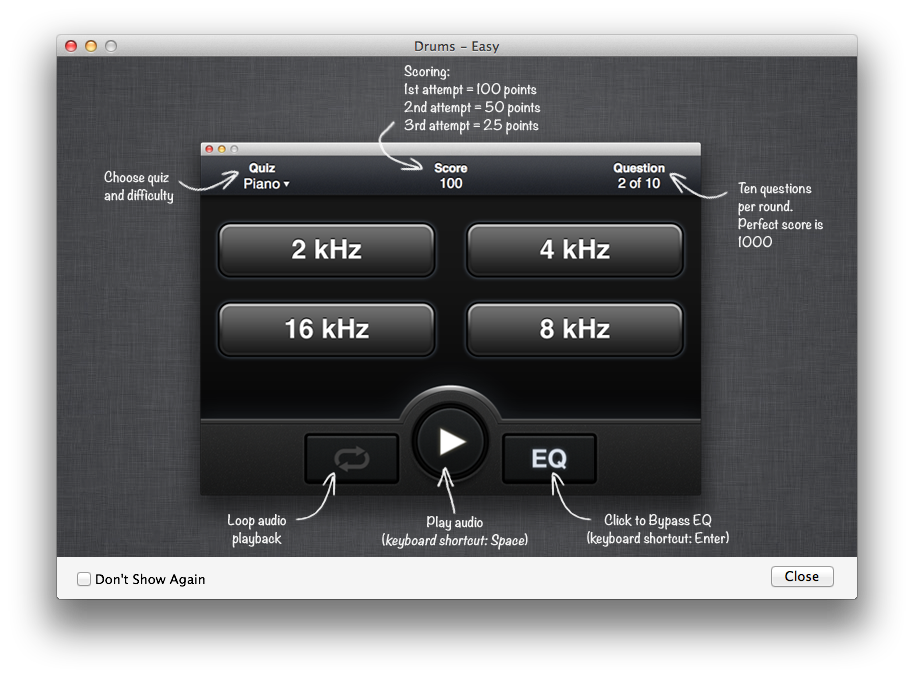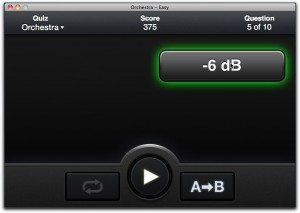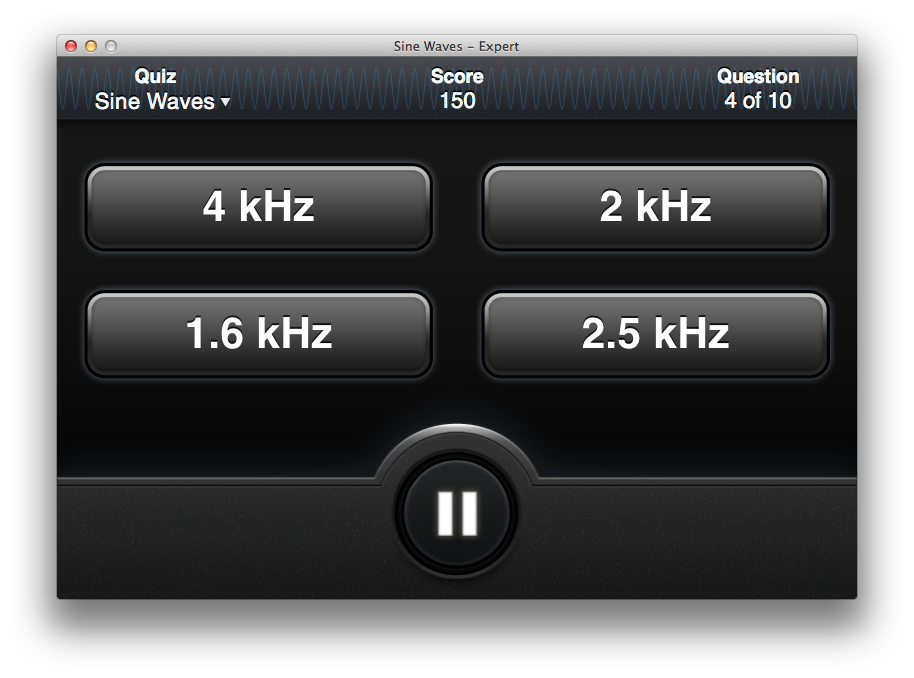This is a review of Quiztones, frequency ear training apps for Mac & iOS from Audiofile Engineering. For questions regarding reviews, please see my FTC Disclosure Statement.
As engineers, we all have particular strengths and weaknesses. Some are musically gifted and play multiple instruments, while others naturally take to composition. However, what about the most basic of skills – our hearing? Unless you have absolute pitch or synesthesia, we’re all playing with the hand dealt to us a birth. The only thing we can do is hone our auditory perception. That’s why so many forms of ear training for musicians and eventually engineers have evolved over the years. Because, according to Quesnel & Woszczyk, “there is substantial evidence…that auditory perceptual skills can be improved by controlled practice and training.”[1]
Auditory perception is one of the most basic skills required of audio engineers as we go about our daily tasks of balancing, treating, and mixing audio. Therefore, providing new ways for engineers (especially students) to develop auditory skills is critical. Thankfully, Audiofile Engineering has created a Mac and iOS based ear training program for audio engineers, Quiztones, which does a fantastic job at helping the listener develop more acute listening and frequency recognition skills.
Deep Background: Why a Change is Necessary
First, to understand why any one solution is ideal, it’s helpful to understand just a tiny bit of history. As audio engineers, we’ve always had some genuinely useful auditory training resources available to us like Dave Moulton’s Golden Ears, F. Alton Everest’s Critical Listening Skills for Audio Professionals (Thomson Course Technology), and even Jason Corey’s Audio Production and Critical Listening (Focal Press). Each one of these is a valuable tool on their own, however they’re a very passive way of learning. 
That is to say, learners would read the text and then take auditory quizzes, which then required manual grading. However, educators across all content areas today recognize the value of learning technology within the classroom, which includes a broad range of communication and related technologies used to support learning, teaching, and assessment.[2] So, why not bring this into audio education? A wonderful parallel example of this comes to us from music education in the use of MacGamut, which allows for mastery-based drill and practice in Aural Skills of Intervals, Scales, Chords, and much more.[3]
As is illustrated by the success of MacGamut in music curricula, auditory training too must consist of truly interactive learning technology for learners to benefit the most, and this is precisely what Quiztones has accomplished.
The Solution: Quiztones
Quiztones has overcome the shortcomings of previous auditory training resources because it is a truly interactive training resource, presenting learners with auditory examples, multiple answers, and real-time feedback in the form of weighted grading. Interestingly, the product was born out of an undergraduate music production program internship and is the product of someone who understands exactly the needs of undergraduate music students. Both the iOS and Mac OS X versions contain the following trainers, which are truly impressive:
EQ Quizzes:
- Easy Frequency Boost (+10 dB)
- Hard Frequency Boost (+5 dB)
- Hard Frequency Cut (-10 dB)
- Expert Frequency Boost (+5 dB) – 1/3 Octave*
Tone Quizzes:
- Easy
- Hard
Gain Quizzes:
- Easy*
- Hard*
* Included in Mac App / In-App Purchase in iOS App
Over the course of using Quiztones, I was positively blown away. Initially, I didn’t perform as well as expected on some quizzes, however with consistent practice I’m pleased to say I’m now performing at the level I’d anticipated. This only further supports the already sound evidence that consistent practice at auditory drills will yield a dramatic improvement. And really, isn’t that what we’re all after?
 However, what’s most impressive is the road ahead for Quiztones. In speaking with the apps’ creator, Dan Comerchero, it’s clear he intends this app to benefit engineers of all ages; whether they’re a seasoned pro looking to brush up their skills or a student just beginning ear training. This is evidenced by the development road-map which includes the addition of a practice mode to both apps, as well as content additions like reverb, delay, and compression trainers which will truly make the tool “feature complete” even when compared to the current industry standard of ear training, Golden Ears.
However, what’s most impressive is the road ahead for Quiztones. In speaking with the apps’ creator, Dan Comerchero, it’s clear he intends this app to benefit engineers of all ages; whether they’re a seasoned pro looking to brush up their skills or a student just beginning ear training. This is evidenced by the development road-map which includes the addition of a practice mode to both apps, as well as content additions like reverb, delay, and compression trainers which will truly make the tool “feature complete” even when compared to the current industry standard of ear training, Golden Ears.
The most interesting thing Dan revealed to me, however, is the current development of a product called “Quiztones Author”. This is a utility which will give educators the ability to customize quizzes based upon the needs of their students and curricula. Currently in beta, this will be a separate utility that educational institutions can purchase as an additional tool for their faculty. The creation of this utility is significant because it will provide university faculty the ability to utilize Quiztones directly as a part of their curricula; allowing the design, distribution and retrieval of scores for quizzes instead of simply recommending the tool as a supplement to classroom instruction. If you are an educator interested in beta testing Quiztones Author, contact dan@audiofile-engineering.com.
Final Thoughts
You might be asking yourself what can “Quiztones really offer me? It’s seems too educational” or even “Why do we need to improve the old systems that were working so well”. To be perfectly honest, those sentiments and many more are understandable. We’re a legacy industry that doesn’t often accept change easily. However, the reason is quite simple; everyone benefits from having better training tools, and the fact that Quiztones is built upon solid educational theory is only one of a dozen reasons to adopt it within your training regimen. Every engineer knows that better frequency recognition helps him or her in the development and discussion of sonic ideas, so why not train and improve aural skills with a system that provides immediate feedback? And, fundamentally, fast frequency recognition helps engineers decide how to react if, for example, they hear X problem in the Y frequency band. So, using a system that helps engineers improve their accuracy over time with varied scenarios in a controlled environment is a tremendous asset.
Can I say that Quiztones is the absolute perfect aural training solution for you? Perhaps not quite yet, as I’d love to see more options in the quiz answers, and I think a “Match the Sound” style trainer would be incredible. Audiofile Engineering tells me this is the direction Quiztones is headed: hearing a modified audio loop and letting users utilize on-screen controls to try and match the modified sound while receiving feedback on accuracy. However, I can say without reservation that Quiztones is by far the best aural training solution currently available, and I urge you to give it a try in your studio or classroom curricula. I’m certain you find the tool worthwhile.
Disclosure: Audiofile Engineering provided me with a copy of Quiztones for review (see my FTC Disclosure Statement), however I’ll gladly pay for any forthcoming upgrades because it’s truly that compelling.
1 René Quesnel and Wieslaw R. Woszczyk, ‘A Computer-Aided System for Timbral Ear Training’, Audio Engineering Society Convention 96, 1994. <http://www.aes.org/e-lib/browse.cfm?elib=6376>
2 What is Learning Technology? The Association for Learning Technology. <http://www.alt.ac.uk/about-alt/what-learning-technology>
3 What is MacGAMUT? MacGAMUT – Music Software International. <http://www.macgamut.com/about/>

Leave a Reply